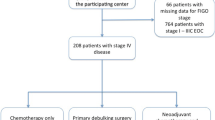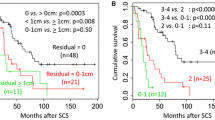Abstract
Background
The role of cytoreductive surgery in relapsed ovarian cancer is not clearly defined. Therefore, patient selection remains arbitrary and depends on the center’s preference rather than on established selection criteria. The Descriptive Evaluation of preoperative Selection KriTeria for OPerability in recurrent OVARian cancer (DESKTOP OVAR) trial was undertaken to form a hypothesis for a panel of criteria for selecting patients who might benefit from surgery in relapsed ovarian cancer.
Methods
The DESKTOP trial was an exploratory study based on data from a retrospective analysis of hospital records. Twenty-five member institutions of the Arbeitsgemeinschaft Gynaekologische Onkologie Ovarian Committee (AGO OC) and AGO-OVAR boards collected data on their patients with cytoreductive surgery for relapsed invasive epithelial ovarian cancer performed in 2000–2003.
Results
Two hundred and sixty-seven patients were included. Complete resection was associated with significantly longer survival compared with surgery leaving any postoperative residuals [median 45.2 vs. 19.7 months; hazard ratio (HR) 3.71; 95% confidence interval (CI) 2.27–6.05; P < .0001]. Variables associated with complete resection were performance status (PS) [Eastern Cooperative Oncology Group (ECOG) 0 vs. > 0; P < .001], International Federation of Gynecology and Obstetrics (FIGO) stage at initial diagnosis (FIGO I/II vs. III/IV, P = .036), residual tumor after primary surgery (none vs. present, P <.001), and absence of ascites > 500 ml (P < .001). A combination of PS, early FIGO stage initially or no residual tumor after first surgery, and absence of ascites could predict complete resection in 79% of patients.
Conclusions
Only complete resection was associated with prolonged survival in recurrent ovarian cancer. The identified criteria panel will be verified in a prospective trial (AGO-DESKTOP II) evaluating whether it will render a useful tool for selecting the right patients for cytoreductive surgery in recurrent ovarian cancer.


Similar content being viewed by others
References
Griffiths CT. Surgical resection of tumor bulk in the primary treatment of ovarian carcinoma. Natl Cancer Inst Monogr 1975; 42:101–4
Bristow RE, Tomacruz RS, Armstrong DK, Trimble EL, Montz FJ. Survival effect of maximal cytoreductive surgery for advanced ovarian carcinoma during the platinum era: a meta-analysis. J Clin Oncol 2002; 20:1248–59
Covens AL. A critique of surgical cytoreduction in advanced ovarian cancer. Gynecol Oncol 2000; 78:269–74
van der Burg ME, van Lent M, Buyse M, et al. The effect of debulking surgery after induction chemotherapy on the prognosis in advanced epithelial ovarian cancer. Gynecological Cancer Cooperative Group of the European Organization for Research and Treatment of Cancer. NEJM 1995; 332:629–34
Hoskins WJ, Bundy BN, Thigpen JT, Omura GA. The influence of cytoreductive surgery on recurrence-free interval and survival in small-volume stage III epithelial ovarian cancer: A Gynecologic Oncology Group study. Gynecol Oncol 1992; 47:159–66
Rose PG, Nerenstone F, Brady MS, et al. Secondary surgical cytoreduction for advanced ovarian carcinoma. N Engl J Med 2004; 351:2489–97
Harter P, du Bois A. The role of surgery in ovarian cancer with special emphasis on cytoreductive surgery for recurrence. Curr Opin Oncol 2005; 17:505–14
Berek JS, Bertelsen K, du Bois A, et al. Advanced epithelial ovarian cancer: 1998 consensus statements. Ann Oncol 1999; 10 (suppl 1):S87–92
SAS Institute, Inc., Cary, NC
Morris M, Gershenson DM, Wharton JT. Secondary cytoreductive surgery in epithelial ovarian cancer: nonresponders to first-line therapy. Gynecol Oncol 1989; 33:1–5
Meier W, Roemisch M, Hepp H. Stellenwert der Rezidivchirurgie in der Behandlung des Ovarialkarzinoms. Geburtsh u Frauenheilk 1993; 53:30–4
Parmar MK, Ledermann JA, Colombo N, et al. Paclitaxel plus platinum-based chemotherapy versus conventional platinum-based chemotherapy in women with relapsed ovarian cancer: the ICON4/AGO-OVAR-2.2 trial. Lancet 2003; 361:2099–106
Pfisterer J, Plante M, Vergote I, et al. Gemcitabine/carboplatin vs. carboplatin in platinum sensitive recurrent ovarian cancer. Results of a Gynecologic Cancer Intergroup randomized phase III trial of the AGO OVAR, the NCIC CTG and the EORTC GCG. Proc Am Soc Clin Oncol 2004; 449:23, (abstr 5005)
Cantu MG, Buda A, Parma G, et al. Randomized controlled trial of single-agent paclitaxel versus cyclophosphamide, doxorubicin, and cisplatin in patients with recurrent ovarian cancer who responded to first-line platinum-based regimens. J Clin Oncol 2002; 20:1232–7
Gonzalez-Martin AJ, Calvo E, Bover I, et al. Randomized phase II trial of carboplatin versus paclitaxel and carboplatin in platinum-sensitive recurrent advanced ovarian carcinoma: a GEICO (Grupo Espanol de Investigacion en cancer de ovario) study. Ann Oncol 2005; 16:749–55
Loehr A, Harter P, Traut A, Gnauert K, du Bois A. Cytoreductive surgery in recurrent ovarian cancer. J Cancer Res Clin Oncol 2004; 130(suppl. 1):S122 (abstract)
Eisenkop SM, Friedman RL, Spirtos NM. The role of cytoreductive surgery in the treatment of patients with recurrent epithelial ovarian carcinoma. Cancer 2000: 88:144–53
Zang RY, Li ZT, Tang J, Cheng X, Cai SM, Zhang ZY, Teng NN. Secondary cytoreductive surgery for patients with relapsed epithelial ovarian carcinoma: who benefits? Cancer 2004; 100:1152–61
Scarabelli C, Gallo A, Carbone A. Secondary cytoreductive surgery for patients with recurrent epithelial ovarian carcinoma. Gynecol Oncol 2001; 83:504–12
Güngör M, Ortac F, Arvas M, Kosebay D, Sonmezer M, Kose K. The role of secondary cytoreductive surgery for recurrent ovarian cancer. Gynecol Oncol 2005; 97:74–9
Berek JS, Hacker NF, Lagasse LD, Nieberg RK, Elashoff RM. Survival of patients following secondary cytoreductive surgery in ovarian cancer. Obstet Gynecol 1983; 61:189–93
Segna RA, Dottino PR, Mandeli JP, Konsker K, Cohen CJ. Secondary cytoreduction for ovarian cancer following cisplatin therapy. J Clin Oncol 1993; 11:434–9
Tay EH, Grant PT, Gebski V, Hacker NF. Secondary cytoreductive surgery for recurrent epithelial ovarian cancer. Obstet Gynecol 2002; 99:1008–13
Leitao MM, Kardos S, Barakat RR, Chi DS. Tertiary cytoreduction in patients with recurrent ovarian cancer. Gynecol Oncol 2004; 95:181–5
Onda T, Yoshikawa H, Yasugi T, Yamada M, Matsumoto K, Taketani Y. Secondary cytoreductive surgery for recurrent epithelial ovarian carcinoma: proposal for patients selection. Br J Cancer 2005; 92:1026–32
Morris M, Gershenson DM, Wharton JT, Copeland LJ, Edwards CL, Stringer CA. Secondary cytoreductive surgery for recurrent epithelial ovarian cancer. Gynecol Oncol 1989; 34:334–8
Munkarah A, Levenback C, Wolf JK, Bodurka-Bevers D, Tortolero-Luna G, Morris RT, Gershenson DM. Secondary cytoreductive surgery for localized intra-abdominal recurrences in epithelial ovarian cancer. Gynecol Oncol 2001; 81:237–41
Cormio G, di Vagno G, Cazzolla A, Bettocchi S, di Gesu G, Loverro G, Selvaggi L. Surgical treatment of recurrent ovarian cancer: report of 21 cases and a review of the literature. Eur J Obstet Gynecol Reprod Biology 1999; 86:185–8
Vaccarello L, Rubin SC, Vlamis V, Wong G, Jones WB, Lewis JL, Hoskins WJ. Cytoreductive surgery in ovarian carcinoma patients with a documented previously complete surgical response. Gynecol Oncol 1995; 57:61–5
Janicke F, Holscher M, Kuhn W, von Hugo R, Pache L, Siewert JR, Graeff H. Radical surgery procedure improves survival time in patients with recurrent ovarian cancer. Cancer 1992; 70:2129–36
Gronlund B, Lundvall L, Christensen IJ, Knudsen JB, Hogdall C. Surgical cytoreduction in recurrent ovarian carcinoma in patients with complete response to paclitaxel-platinum. Eur J Surg Oncol 2005; 31:67–73
Zang RY, Zhang ZY, Li ZT, Chen J, Tang MQ, Liu Q, Cai SM. Effect of cytoreductive surgery on survival of patients with recurrent epithelial ovarian cancer. J Surg Oncol 2000; 75:24–30
Acknowledgment
*Further members of the study coordinating group of the AGO OVAR and/or the AGO OC who contributed to this study are (in alphabetic order): U. Canzler (Dresden), V. Heilmann (Ulm), C. Jackisch (Marburg), W. Kuhn (Bonn), H.J. Lueck (Hannover), O. Ortmann (Regensburg), B. Richter (Radebeul), I. Runnebaum (Jena), P. Wimberger (Essen).
The authors thank S. Eichner, A. Krüger, M. Schulze (AGO-OVAR study office Kiel, Germany), and C. Ackermann, G. Elser (AGO-OVAR central unit Wiesbaden, Germany) for data management and technical support, and J. Rochon and C. Schade-Brittinger (KKS Marburg, Germany) for statistical support. This work is dedicated to Helge Prinz who was recently deceased. He was a mentor and statistical consultant for the AGO DESKTOP series, and we will continue this series in his memory.
Author information
Authors and Affiliations
Corresponding author
Rights and permissions
About this article
Cite this article
Harter, P., Bois, A.d., Hahmann, M. et al. Surgery in Recurrent Ovarian Cancer: The Arbeitsgemeinschaft Gynaekologische Onkologie (AGO) DESKTOP OVAR Trial. Ann Surg Oncol 13, 1702–1710 (2006). https://doi.org/10.1245/s10434-006-9058-0
Published:
Issue Date:
DOI: https://doi.org/10.1245/s10434-006-9058-0




